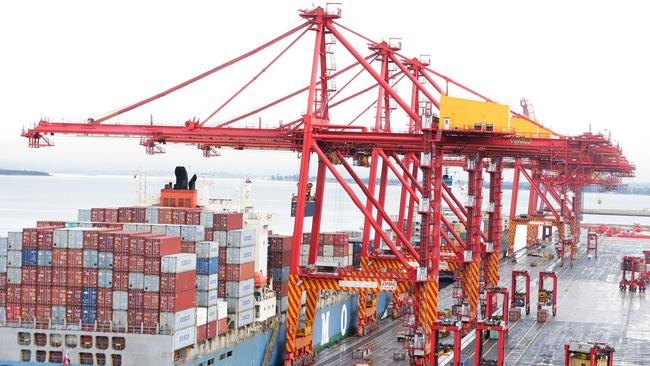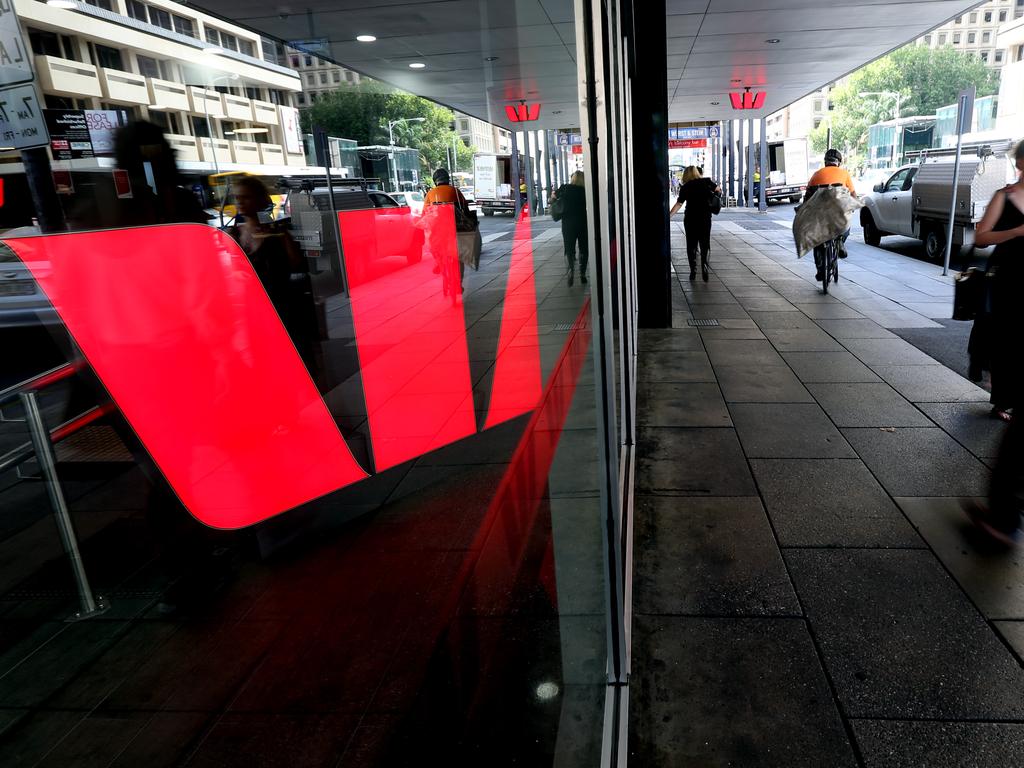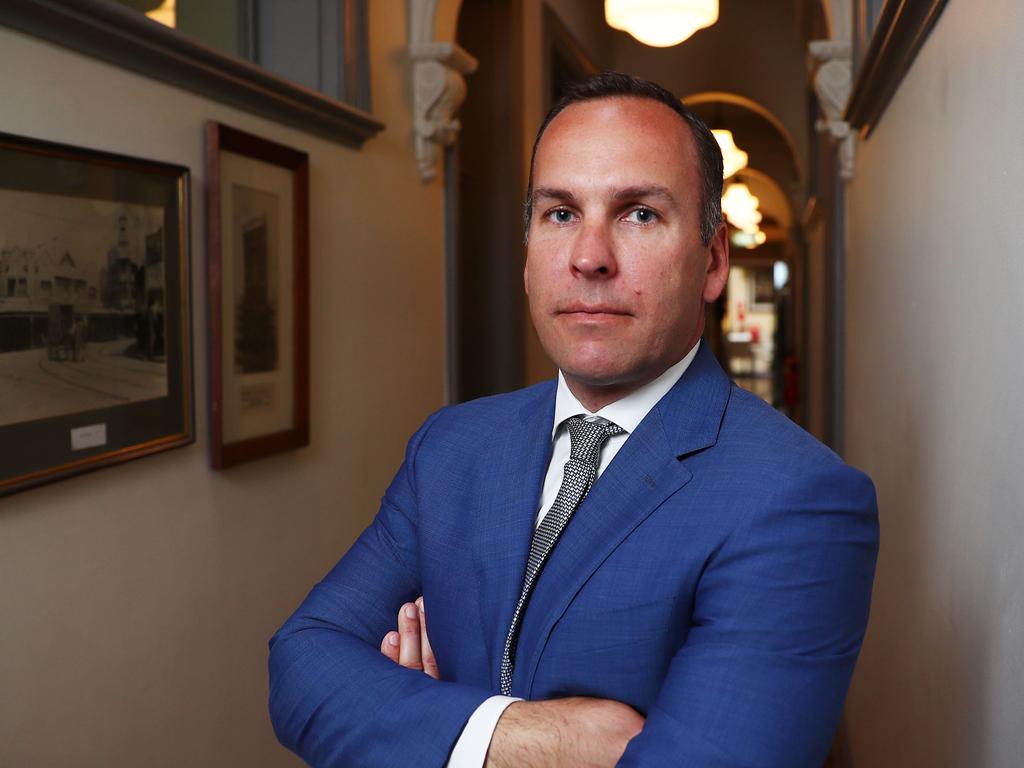
Ports operator Patrick reports it is operating at 40 per cent capacity at its Port Botany site in Sydney, which has delayed ships in ports across the country. Delays into Melbourne run to 9½ days, and 17 days at Port Botany.
The delays are sending shipping costs higher, with freight forwarders putting a $600 surcharge on a 40-foot container and a 20-foot container carrying a $300 charge.
One shipping line, Maersk, is diverting vessels away from Sydney, while another, OOCL, is avoiding the east coast.
All of which makes it tough if you are trying to get things out of the country or bring them in.
Importers say demand within Asia means it is difficult to get slots on a boat, which in turn means they have to stagger arrivals, which then increases costs further because shipments cop a levy.
AiG’s Innes Willox said the shipping delays were a major cause of problems for the Australian economy, threatening supply chains and delaying goods across the board.
The Freight and Trade Alliance warns of the domino effect of congestion at ports around the country and says they need to be resolved to avoid further major damage.
On the industrial relations front, the Maritime Union of Australia settled a protected action with DP World last weekend that means there will be no further action until the end of next month. But other operators are being targeted.
The MUA actions are all protected as they are part of the bargaining for a new enterprise agreement.
The enterprise agreement includes a 6 per cent annual wage increase for the next four years, a guarantee of no job losses and a $2000 sign-on bonus for the new agreement. That in itself is a fair wage rise.
For its part, the union says Patrick has had its own issues at the terminal that have caused delays.
Companies affected include many supplying infrastructure for the country’s revival plans, but that won’t happen if the goods don’t land on time.
Suffice to say the mayhem could not come at a worse time, post-COVID.
Importers are complaining their containers are being stranded in Shanghai because the big shipping companies are avoiding Australia where possible because of the delays and competing demand elsewhere. Recent reports of potential shortages for the big supermarkets are in part caused by the mayhem.
Everyone is working overtime to try to revive the Australian economy but the logjams on the wharves are threatening to destroy the effort.
Tick for small business
Josh Frydenberg’s small business insolvency reforms tick most of the boxes, including potentially ridding the government of negative press from a swathe of bankruptcies next year.
The government’s fiscal bailout has kept many companies afloat and politically it wouldn’t look great for a string of corporate failures next year.
The Treasurer’s reform package is a welcome simplification that will give some businesses the chance to recover.
They will need the support of half their unsecured creditors and, with banks and landlords often secured, the remaining wildcard is the tax office.
Small Business Ombudsman Kate Carnell, who recommended this package in her report in July, would like the next leg to include a voucher to pay for financial advice for small business.
Roughly half the nation’s 2.2 million small businesses don’t make it past year five, often for lifestyle reasons, but this year’s pandemic has wreaked havoc and Deloitte figures 240,000 could go under.
Frydenberg’s reforms offer small businesses a “window of opportunity to trade out of their distress”, according to ABL partner Leon Zwier.
He tends to deal at the big end of town away from small business where the average fee is $50,000 and would like the next reform step to offer limited amnesty in schemes of arrangement so big companies can retain control while working out of financial trouble.
The model based on UK and Singapore law would be for an automatic amnesty once a scheme was filed, which would give the company time to work through the administration without being wound up by anxious bankers and other creditors.
US-style Chapter 11 debtor-in-possession restructuring is held up as a model, but while it works for small companies with debts under $1m, according to KordaMentha’s Mark Korda they are expensive and, by handing courts control, take too long.
The recent Virgin voluntary administration was wrapped up in five months at a cost of less than 1 per cent of assets, compared to the US cases that tend to cost at least 1 per cent of assets and debt and can run for at least double that time.
Virgin administrator Deloitte completed the sale with Bain on day one via a deed of company arrangement (DOCA) and an asset sale if the DOCA didn’t win creditor approval.
Small Business Ombudsman figures show that in the year to June, 85 per cent of small businesses that went under had less than $10,000 in cash, 76 per cent had liabilities of less than $1m, 76 per cent had less than 20 staff, 81 per cent had no outstanding wage entitlements, 89 per cent had less than 50 unsecured creditors and 92 per cent returned zero to unsecured creditors.
When the corporate undertaker was called in, the common response was simply to sell the assets and move, but this time, according to COSBOA’s Peter Strong, the business owner will have some say in his or her future.
Outside lifestyle reasons, the cause of small business failures include 51 per cent poor cash management, 43 per cent poor strategic management and 40 per cent trading losses.
COVID results will be weighed towards the latter metric.
In concept, the plan is a welcome one and the expected quibble with details will hopefully complete a plan that works better in practice than the UK comparison.
Westpac’s fair whack
Westpac’s $1.3bn Austrac fine cuts its tier-one capital by eight basis points to 10.9 per cent, which on any reading is a fair whack to bank shareholders.
The question then is raised whether past management led by Brian Hartzer should cop a further penalty under the clawback provisions of the new APRA rules.
Clawbacks were recommended by the CBA review as a tool to promote ethical behaviours, good conduct and as a way of promoting good risk management and governance.
Former Westpac boss Hartzer lost his job in the wake of the Austrac snafu and in the process in his final year in 2019 only received his $2.7m fixed pay, with no bonuses and all unvested and deferred equity cancelled.
On that score, the Westpac board has already delivered a fair penalty and there is no need for more.
Michael Hawker is a welcome addition to the Westpac board, but past links should be noted given he was on the Aviva board in the UK when present Westpac chair John McFarlane was chair.
Same deal at ANZ with incoming chair Paul O’Sullivan a newly transferred executive at SingTel when outgoing ANZ chair David Gonski joined the SingTel board.








A combination of strong demand in Asia and threats of industrial action on the waterfront is creating havoc for business.